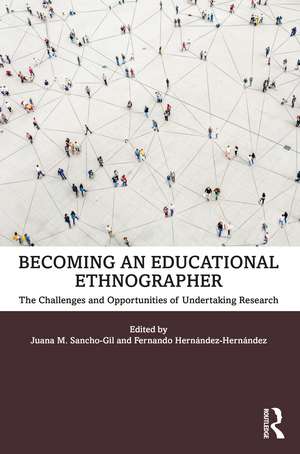Becoming an Educational Ethnographer: The Challenges and Opportunities of Undertaking Research
Editat de Juana M. Sancho-Gil, Fernando Hernández-Hernándezen Limba Engleză Paperback – 29 dec 2020
With a range of carefully chosen international contributions, this book uses a variety of practical case studies to provide further information about the pros and cons of this research perspective. Chapter authors share the knowledge and experience gained from the research and how it has affected their approach to social phenomena.
This book is an ideal introduction for anyone considering research approach or becoming an educational ethnographer and will be of interest to researchers already working in this field.
| Toate formatele și edițiile | Preț | Express |
|---|---|---|
| Paperback (1) | 357.17 lei 6-8 săpt. | |
| Taylor & Francis – 29 dec 2020 | 357.17 lei 6-8 săpt. | |
| Hardback (1) | 762.90 lei 6-8 săpt. | |
| Taylor & Francis – 29 dec 2020 | 762.90 lei 6-8 săpt. |
Preț: 357.17 lei
Nou
Puncte Express: 536
Preț estimativ în valută:
68.35€ • 71.69$ • 56.90£
68.35€ • 71.69$ • 56.90£
Carte tipărită la comandă
Livrare economică 01-15 aprilie
Preluare comenzi: 021 569.72.76
Specificații
ISBN-13: 9780367466497
ISBN-10: 036746649X
Pagini: 168
Ilustrații: 1 Halftones, black and white; 10 Tables, black and white; 1 Illustrations, black and white
Dimensiuni: 156 x 234 x 23 mm
Greutate: 0.48 kg
Ediția:1
Editura: Taylor & Francis
Colecția Routledge
Locul publicării:Oxford, United Kingdom
ISBN-10: 036746649X
Pagini: 168
Ilustrații: 1 Halftones, black and white; 10 Tables, black and white; 1 Illustrations, black and white
Dimensiuni: 156 x 234 x 23 mm
Greutate: 0.48 kg
Ediția:1
Editura: Taylor & Francis
Colecția Routledge
Locul publicării:Oxford, United Kingdom
Public țintă
Postgraduate, Professional, and Undergraduate AdvancedCuprins
Chapter 1. Researching -and being ethnographic researcher- as a process of becoming Part I: Becoming as moving researcher positionality Chapter 2. Roots and Routes to Reading the World as an Ethnographer Chapter 3. Becoming an Educational Ethnographer by Organized Representations of Educational Realities and ‘Researching Through’ Chapter 4. Becoming Educational Ethnographer through Time and Ontological Displacements Chapter 5. Becoming an Ethnographer: Living, Teaching and Learning Ethnographically Chapter 6. The Challenges and Opportunities of Becoming an Ethnographer Part II. Becoming as an onto-epistemological framework Chapter 7. What-comes after Becoming. Virtualities at the End of a Doctoral Research. Chapter 8. Chapter 8- An ethnographic research based on an ontology of becoming Chapter 9. Openness to the Unforeseen in a Nomadic Research Process on Teachers’ Learning Experiences Part III. Becoming as a concept that allows to re-signify the subjectivity Chapter 10. An Accidental Institutional Ethnographer: Reflections on Paradoxes and Positionality Chapter 11. Researchers and risk: exploring vulnerability, subjectivity, and identity in ethnographic research through collage making Chapter 12. Ethnographic Educational Research as Assemblages of Teachers’ and Researcher’s Movements and their Learning Environments
Notă biografică
Juana M. Sancho-Gil is Emeritus Professor of Educational Technologies in the Faculty of Education, University of Barcelona, Spain.
Fernando Hernández-Hernández is Professor of Contemporary Visualities, Psychology of Art and Arts-based Research in the Unit of Cultural Pedagogies at the Fine Arts Faculty, University of Barcelona, Spain.
Fernando Hernández-Hernández is Professor of Contemporary Visualities, Psychology of Art and Arts-based Research in the Unit of Cultural Pedagogies at the Fine Arts Faculty, University of Barcelona, Spain.
Descriere
This book provides practical advice on the learning and teaching perspectives of ethnography, including what undertaking research looks like and the experiences it will bring.
